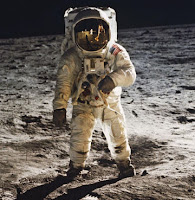 I think our exploits in space did achieve something truly awesome. It gave us an off-Earth view of our own planet and taught us that of all the lumps of rock and swirling gas that make up our solar system the only one of unbelievable beauty and worth is the one we are already on.
I think our exploits in space did achieve something truly awesome. It gave us an off-Earth view of our own planet and taught us that of all the lumps of rock and swirling gas that make up our solar system the only one of unbelievable beauty and worth is the one we are already on.Our planet has water, an atmosphere, everything required to sustain life, and it has us. Not just our bodies but our minds, with our ability to imagine, to create fiction. Only from our own planet can we conjure up beauty out there. We glory in, even worship, the sun when it’s a life-giving source of light and warmth that slips with reassuring certainty across our blue sky. In reality, it’s a lump of hot plasma, engaged in nuclear fusion. We gaze adoringly at the eerie loveliness of the white moon in our dark night. In reality, it’s dead rock, nothing else. What is more beautiful than the evening star, a low bright pageboy to the sinking sun… It’s Venus, and in reality it’s a boiling image of Hell under clouds of sulphuric acid.
Mars, the red planet in our imaginations is the home of aliens, Martians, who can both fascinate and terrify us – except that in reality if there ever was any chance of life on it, it has long gone, with its atmosphere.
Jupiter, Saturn, Uranus and Neptune are balls of gas. Their moons are rocks. They might be volcanic. They might even harbour water.
Scientists get excited about this and so should we all. It is exciting. But not as exciting as the volcanoes on earth, reminding us, whenever they erupt, of our own limitations as masters of the universe. Not as exciting at the vast oceans of water that cover Earth, with depths that we have yet to explore and life forms that we have yet to discover.
That is not a bad thing, at least for novelists. The unknown opens up an endless source of speculation and possibilities, which definite answers will only spoil. From Earth, our imagination opens up Space in a way technology never will. We can do the impossible. NASA may be able to lift a bit of metal out of Earth’s gravity and dump it on the Moon, but in our imaginations we can travel faster than light and visit distant galaxies. And we do it on the most perfect planet there is – unless we manage to mess it up.






No comments:
Post a Comment
comments welcome